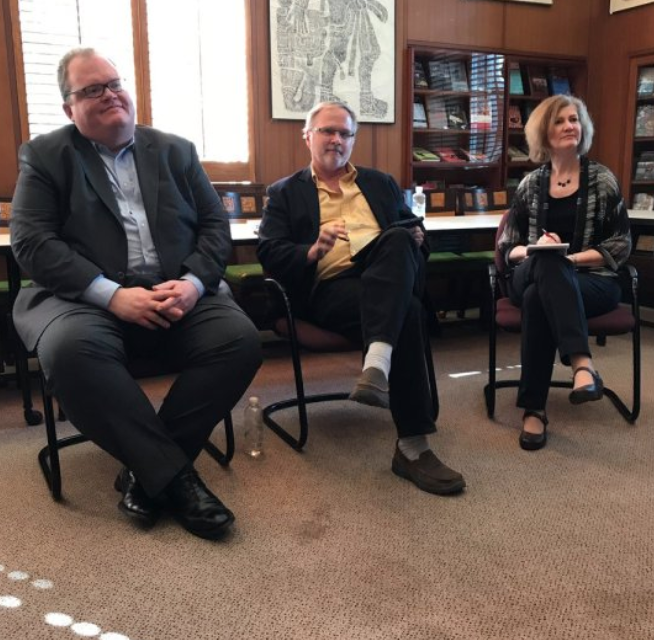On April 21, the Stone Center and the Center for Inter-American Policy and Research (CIPR) at Tulane University hosted a discussion of recent political events in Venezuela, including Jennifer McCoy (Georgia State University), David Smilde (Tulane University), and Harold Trinkunas (Stanford University). Each panelist discussed several important dimensions involving the Venezuelan political-economic crisis. Below I summarize what each of these panelists argued.
David Smilde provided an overview of how recent political events have unfolded in Venezuela. He pointed out that the opposition is enjoying more international sympathy at this point than during protests in 2014. In 2014, opposition radicals took to the streets to demand the resignation of President Nicolás Maduro, who had been elected only a year before, and whose coalition had just received strong support in the December 2013 regional elections. To many observers, this appeared as a rather unreasonable objective.
Given the Venezuelan government’s recent authoritarian moves though – including the elimination of a recall referendum effort and a court ruling that effectively dismantled the national legislature, the opposition’s current demands for respect for the National Assembly and an electoral calendar appear much more reasonable.
Smilde also discussed how the U.S. had for the most part taken a back seat in regional discussions involving Venezuela. Instead, countries like Mexico and Peru have taken the lead in drawing attention to the political-economic crisis facing the country. Smilde argued that a new round of U.S. sanctions on Venezuela could distort these regional efforts. He suggested that the opposition needs to retain its focus on an electoral calendar and not be carried away by protestors’ demands for Maduro’s immediate resignation, which is unlikely to happen.
Beginning with the mid-20th century, Jennifer McCoy recounted recent political history in Venezuela. Following the Venezuelan transition democracy, she pointed out that Acción Democratica and COPEI, two centrist political parties, dominated politics within the country. As dismay with government corruption and the two-party system mounted in the 1990s, however, Venezuelans looked for political alternatives. A turning points was the February 1989 Caracazo, which resulted in the deaths of, at least, hundreds, if not thousands, of poor individuals within the capital region.
At that point, Hugo Chávez served in the Venezuelan military and had become disheartened by the military’s repression of citizens throughout the country. In 1992, Chávez fomented an unsuccessful coup, but, after his release from prison, formed a grassroots movement that snowballed into a political party. In 1998, he won his first presidential election and maintained the presidency until his death in March 2013.
McCoy pointed out that important socio-economic gains were made under Chávez. His government established several social missions that combated problems such as illiteracy and lack of access to healthcare, and Chávez promoted participatory democracy and several political initiatives, including the creation of communal councils and worker cooperatives. Nevertheless, McCoy demonstrated that Chávez also increased Venezuelan dependence on oil and failed to diversify the economy. In addition, she asserted that Chávez became one of the current political period’s first populist leaders.
While McCoy argued that there were moves towards authoritarianism under Chávez, she asserted that the slide towards an authoritarian state has greatly increased under President Maduro. Under Maduro, there has been an escalation of arrests of opposition activists and Maduro has actively sought to undermine the opposition-controlled legislature. For her, the termination of the recall referendum signified the end of democracy in Venezuela.
McCoy stated that there now remains several possible scenarios for Venezuela. She said that rising oil prices could potentially help Maduro muddle through the end of his term. However, she also argued that some sort of negotiated transition could also ensue. In order for the Maduro government to accept some sort of transition though, she pointed out that the opposition must lower exist costs, including costs for those suspected of human rights violations and corruption.
Finally, Harold Trinkunas discussed the role of the Venezuelan military amid the crisis. Under Chávez, he pointed out that the Venezuelan government promoted a stronger role for the military in government affairs. As a military man himself, Chávez appointed several military members to government positions. Despite this, Trinkunas asserted that President Maduro has increasingly come to more heavily rely upon the military than Chávez did, largely due to Maduro’s lack of charisma. As a result, this has allowed the Venezuelan military more leverage over government policy.
Trinkunas pointed out that the Venezuelan government so far has not involved the Venezuelan Army, Navy, or Air Force in any repression of protests. He suggested that such a request could become a red line that might turn military members against the government. Still, he argued that many in the military benefit from the corruption that has characterized the Maduro government and, as a result, high exit costs for many military members remain. He suggested the opposition needed to provide the military with indications of what a transition in power would mean for them.



